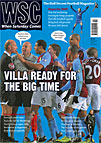 Some retired footballers go into management, but for many lazing on the cosy pundits' sofa is irresistible. Harry Pearson observes
Some retired footballers go into management, but for many lazing on the cosy pundits' sofa is irresistible. Harry Pearson observes
Back in the 1960s, commentators such as Kenneth Wolstenholme and Huw Johns effectively spent 90 minutes on Saturday afternoon talking to themselves: “Now I wonder what United can come up with in response to that?” They would probe, before replying, after a brief pause: “This boy Brown looks like he may have half an idea!”
When he was finished chatting with himself, Wolstenholme handed back to the studio, where a veteran sports hack with a face like a bag of spanners talked to himself about what Kenneth had just been talking to himself about. And so the evenings passed uninterrupted by the expert opinions of retired footballers.
Time has marched on. Ex-pros got a toehold in the studio in the early Seventies and since then have proliferated like tribbles. These days, with expert summarisers, pundit panels and post-game discussions, there are weekend afternoons in Britain when there are more footballers in studios and on gantries than there are on the fields of play.
For the listener this can be disorienting. When I switch on Radio 5 Live mid-match I generally spend at least 15 minutes trying to fathom who the summariser is, working off accents and the snippets of information the commentator throws my way. It’s not an easy game to play, because while at one time you could be more or less guaranteed that the summariser would at least be an international – which narrowed the field somewhat – these days it could, literally, be any old pro who happened to be handy.
A few weeks back I was stacking logs in the wood shed with the radio blaring and thinking: “He’s from the north-east. He’s called Steve. But it’s not Steve Stone. Mmm, some Newcastle connection…” Still smarting from the previous week when I had failed to identify Michael Bridges, I racked my brains but despite every effort still had to wait until the final whistle to discover it was… Steve Harper. The Toon’s reserve goalkeeper, blimey. No wonder I couldn’t get it. It was like playing a game of charades and being faced with acting out one of the lesser-known straight-to-DVD movies from the Chuck Norris canon.
The effect of all these former pros on the listener is a minor matter, however, compared to the consequences that his hoovering up of talent by the media is having on the British game as a whole. The sacking of Paul Ince inevitably brought another bout of hand wringing over “where the next generation of native coaches is coming from”. This cry was heard on TV and radio stations across the land. Ironically, it is the punditry legions doing most of the wailing and gnashing who are a major part of the problem. Because faced with the choice between the cushy life of the TV or radio pundit and the exacting world of professional football coaching, more and more former players are opting for the sofa ahead of the dugout. And who can blame them? Football managers get fired all the time. But the pundits, bar the odd high-profile casualty such as Peter Schmeichel, just rumble on and on forever.
Some of the top pundits have even dipped their toes in the chill water of management before scampering back to the warmth of the studio. Andy Gray was assistant to Ron Atkinson at Aston Villa and briefly flirted with the Everton job before settling for the life of Sky; Mark Lawrenson had spells at Peterborough and Oxford before squiggling down opposite Gary Lineker; Steve Claridge was in charge of Weymouth before the lure of being paid to say “They know the rules but they don’t know the game” over and over again presented itself.
When the subject of Alan Shearer taking over at St James’ Park is raised, Newcastle fans may like to recall the number of times Alan Hansen was linked with a triumphant return as boss of Liverpool, before people finally twigged that he actually preferred sprawling on his chair and spouting lists of nouns. I am not saying that any of these men or their colleagues would have secured the future of the British game, but if they hadn’t, at least we’d have had the consolation of being allowed to torment them with cries of “You’re getting sacked in the morning”, which is more than we are allowed now.
As for the problem of identifying the summarisers, I think I have a solution. Many year ago I worked in a luxury London hotel, with a famous bar staffed by four barmen called Harry, Bill, Ted and Bob. These names never altered no matter how many barmen came and went and what their names were. If a Harry left a Harry replaced him, whether the new man was named Harry or not. The idea behind this was simple – it gave a sense of continuity and stability. Returning customers knew where they were.
Perhaps the BBC could set an example and introduce a similar policy with its pundits. In the future they could ensure they are all called Mark, Alan or Lee. This will save the viewers a whole lot of time trying to remember their names and the BBC captioning department a big pile of money. And since they all say pretty much the same thing anyway, nobody – save the odd forager for truth and insight – will be the loser.
From WSC 264 February 2009